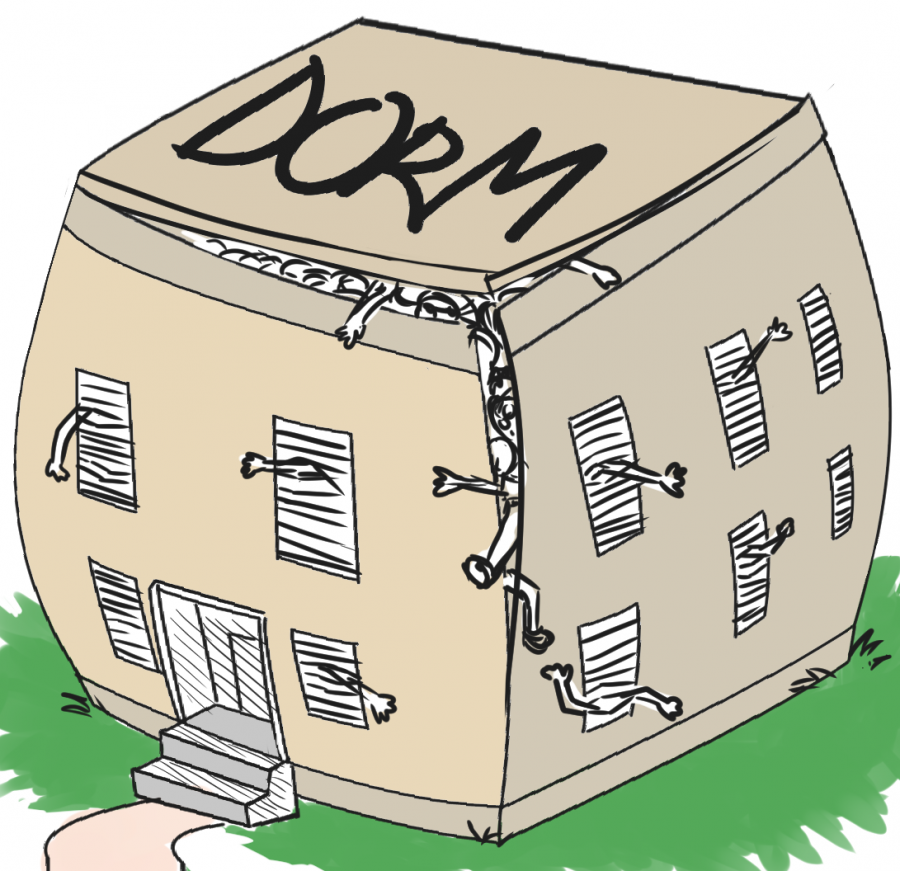When Gage Krause and Tailai Liu applied for on-campus housing their freshman year, they were both on the late end of the application timeline. Neither were shocked, then, when they received a notice that they would be placed in supplemental housing, temporary rooms made available when the university runs out of regular dorms.
While Liu’s experience is a supplemental housing success story, Krause’s reflects the system’s greatest weaknesses. For two students entering the same type of housing, their stories should not show this much discrepancy in their experiences.
“I wasn’t really notified about where I would be living,” Krause recalls. When he eventually got his assignment, a repurposed TV room in Roberts Residence Hall, he found that while the room was massive: He had five roommates instead of one, bunks instead of beds and dining tables instead of desks.
As the noise and conflicting schedules of six people rendered the room unusable for studying and often sleeping, Krause, now a government and philosophy junior, often found himself leaving his dorm for long periods of time. Liu, a business freshman who currently lives in supplemental housing, says it is “horror stories” like this that made him anxious when he got the notification that he was on the supplemental list.
Without much of an option, Liu decided to sign the Division of Housing and Food Service’s supplemental contract and was pleasantly surprised at the result. Liu currently lives in the San Jacinto Dormitory and only has two roommates, but his room is nevertheless much larger than a regular dorm room. There are no bunk beds, no dining tables either and Liu and his roommates each have their own desks.
Even when Liu was given the opportunity to move to a permanent dorm room in Whitis Court earlier this month, like 75 percent of students in supplemental housing he turned it down, as he and his roommates prefer their room to a permanent one. Krause, on the other hand, took the opportunity to leave as soon as he got it — a decision that’s hard to fault him for.
About two weeks before spring break, Krause got an email saying that he could move to a permanent dorm. Even though his freshman year was almost over and he would be paired with a new roommate, he took the offer, rejecting the temporary housing that nearly became permanent.
Ryan Colvin, assistant director of occupancy management at DHFS explained that “over time, (DHFS) gathered student feedback and worked with staff to determine which rooms make good supplemental rooms.” The feedback Colvin cites has turned Roberts F005, Krause’s old room, back into a TV lounge — but it won’t necessarily stay that way forever. The past two years have seen less on-campus applicants than normal, meaning that for lasting improvement we need a change in policy, not luck.
With Creekside Residence Hall likely being replaced in upcoming years, Colvin anticipates the DHFS will have to “maximize” supplemental housing space, either finding new rooms to house students in or adding more beds in current rooms. While out of commission now, Krause’s room could easily end up housing future Longhorns, and rooms like Liu’s that are currently comfortable could wind up being claustrophobic.
Progress has been made toward bettering UT’s supplemental housing experience, but still a quarter of those in supplemental housing opt out when given the chance. With possible shortages on the horizon, the DHFS must not jeopardize consistency of quality for a temporary housing fix.
Buckner is a Plan II and government freshman. He is a columnist.





















